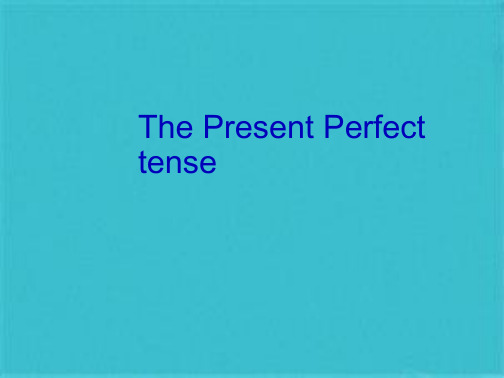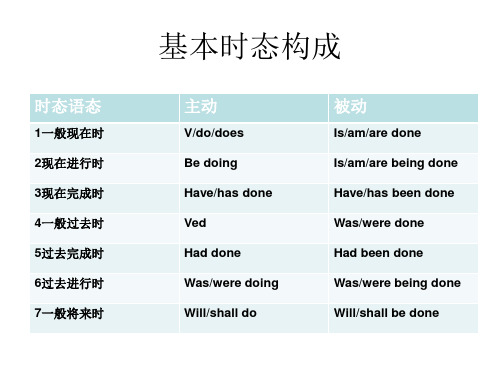现在完成时PPT
合集下载
初二人教英语现在完成时态课件(共25张PPT)

常见非延续性动词和延续性动词的转变
❖ arrive/come/go to be in
die
be dead
❖ become a
be a borrow
keep
❖ Leave/ move
be away / be out
❖ buy
have open
be open
❖ join
be in/a member of
5. --How many times _h_a_v_e____ you __r_e_a_d___ (read) this book?
❖ --I _h_a_v_e_r_e_a_d_ (read) it several times.
6. My brotherb_ou_g_h_t____ (buy) a car last month.
❖ The twins have joined the army. (since they are 18years old) The twins have been soldiers/ been in the army since they are 18years old.
-- When c_a_m_e_____ she _________ (come)? -- She ________ (come) just now.
I lived there 2 years ago
past
present
I have lived here for two years
❖ 1.都表示过去发生的事 ❖ 2.现在完成时强调过去和现在的联系,不能和具
定回答) He has already finished a story book.
4.He finished reading a story- book. (改成现在完成时)
现在完成时讲解(完整版)(共17张PPT)

3. My sister has had her cell phone _____fo_ra month .
4. My friends haven’t visited me ___s_in_c_efew days ago.
5. We haven’t used our car _____faorlong time .
I have planted all the trees. 注:主语假设是第三人称单数助动词用 has
finished 9. goes 10. have, found 11. is He’ll be back soon.
Where’s Li Ming ? He __________ (go) to the teacher’s office.
否认形式 haven’t ( have not 〕 +过去分词 I ________ (see) it last week.
Where’s Li Ming ? He __________ (go) to the teacher’s office.
hasn’t ( has not ) +过去分词 have, stayed 8.
have, finished
have, stayed
• 1. have, seen, saw 2. Has, finished 3. has, —Yes, I ___________ New York twice.
You have planted all the trees. since: (自…以来)
6. She hasn’t had a good cup of coffee _____yefaorrs.
7. Tom has worn glasses _______he was 7 years old. since
4. My friends haven’t visited me ___s_in_c_efew days ago.
5. We haven’t used our car _____faorlong time .
I have planted all the trees. 注:主语假设是第三人称单数助动词用 has
finished 9. goes 10. have, found 11. is He’ll be back soon.
Where’s Li Ming ? He __________ (go) to the teacher’s office.
否认形式 haven’t ( have not 〕 +过去分词 I ________ (see) it last week.
Where’s Li Ming ? He __________ (go) to the teacher’s office.
hasn’t ( has not ) +过去分词 have, stayed 8.
have, finished
have, stayed
• 1. have, seen, saw 2. Has, finished 3. has, —Yes, I ___________ New York twice.
You have planted all the trees. since: (自…以来)
6. She hasn’t had a good cup of coffee _____yefaorrs.
7. Tom has worn glasses _______he was 7 years old. since
初中现在完成时讲解ppt

for
since
for
since
for
since
练习题: 1.It's a long time since we ____ (meet) last, isn't it? 2.--I know you ___________ (choose) a picture book among these. --Yes,Have a look at it, please. 3.So far, spaceships without people ___________ (reach) the moon and some other parts of the universe. 4.My father____ home for nearly three weeks. A.has gone away from B.has left C.has been away from D.went away 5.Mr. and Mrs. Green have_____in China for a week. A.been B.got C.arrived D.reached
eg.--- I’ve lived here for 15 years. eg.--- I’ve lived here since 15 years ago(1990)
选用for和since填空: 1.We haven’t seen each other ______ a long time. 2.His father has been in the factory ______ 10 years ago. 3.The film has been on ______ 20 minutes. 4.Mr Green has worked here ______ he came to China. 5.His grandparents have been dead ______ several years. 6. It’s five years _______ we met last time
since
for
since
for
since
练习题: 1.It's a long time since we ____ (meet) last, isn't it? 2.--I know you ___________ (choose) a picture book among these. --Yes,Have a look at it, please. 3.So far, spaceships without people ___________ (reach) the moon and some other parts of the universe. 4.My father____ home for nearly three weeks. A.has gone away from B.has left C.has been away from D.went away 5.Mr. and Mrs. Green have_____in China for a week. A.been B.got C.arrived D.reached
eg.--- I’ve lived here for 15 years. eg.--- I’ve lived here since 15 years ago(1990)
选用for和since填空: 1.We haven’t seen each other ______ a long time. 2.His father has been in the factory ______ 10 years ago. 3.The film has been on ______ 20 minutes. 4.Mr Green has worked here ______ he came to China. 5.His grandparents have been dead ______ several years. 6. It’s five years _______ we met last time
现在完成时ppt精品课件

B: Where did you buy it?
A: I bought it in my hometown. A: have you seen the film? B: Yes, I have. A: When did you see it? B: I saw it last Sunday.
现在完成时不能与表示过去的时间状语连 用,常与之连用的时间状语有:
6. Mr. Brown has had his TV __f_o_r__ 15 years. 7. I’ve taken driving lessons __s_in_c_e__last month.
8. My sister has had her cell phone _f_o_r___a month .
He studied English for five years.
(只说明他过去学过五年英语,但现在不学了。)
❖ I’ve lived here for ten years. 我在这里住了 10年。(现在仍住这儿)
❖ I lived here for ten years. 我在这里住过10 年。(现在不住这儿了)
再加“ ed ”。 , study---studied---studied
cry---cried---cried
(4)、重读闭音节结尾,末尾只有一个辅音字母, 先双写该辅音字母,再加“ ed ”。
stop---stopped---stopped drop---dropped--dropped
2、不规则变化
当有 so far, in/during/over the past/ last few days(在过去/最近的几年里),since 接过去时间状语或过去时的句子等常用 现在完成时 (不能与确定的时间)
高三英语现在完成时与过去完成时课件(共19张PPT)

A: What had you done before you I _h__a_d_w__a_tc_h_e_d__(watch) TV.
A: What __a_re___ you _d_o_i_n_g__(do) now?
B: I __a_m__w_r_i_t_in_g___(write) a letter to my friend Tom.
The Past Perfect Tense 过去完成时态
have/has+过去分词
1.现在完成时态表示过去发生的动作对现在造成的影响或 结果
Our teacher has left. We have studied English. I have already finished the homework. He has had his lunch. He has become a doctor.
5. 根据上下文判断 I went to Li Hong’s house, but he ___h_a_d_g_o_n__e__(go) out.
Fill in each blank with the proper verb form: 1. He said that he _h_a_d__w_r_it_t_e_n_ (write) that letter.
So
I
__a_m__a_n_s_w_e_r_i_n(ganswer)
his
A: When _w__il_l____ you ___p_o_s_t__(post) it?
B: I _w_i_l_l _p_o_st__(post) it as soon as I _f_in__is_h___(finish) writing.
5. Mary told me she __h_a_d__m__et___(meet) my mother before.
《现在完成时态》ppt课件

REPORT
现在完成时态
CATALOG
DATE
ANALYSIS
SUMMARY
目录
CONTENTS
• 现在完成时态的定义 • 现在完成时态的用法 • 现在完成时态与一般过去时的区别 • 现在完成时态的特殊用法 • 现在完成时态的练习与解析
REPORT
CATALOG
DATE
ANALYSIS
SUMMAR Y
翻译练习
总结词
跨文化理解
总结词
句型转换能力
详细描述
通过将英文句子翻译成中文,学生可以更 好地理解现在完成时态在中文表达中的对 应形式,促进跨文化交流和理解。
详细描述
翻译练习不仅要求学生掌握时态的转换, 还需要注意句型的变化和语言的流畅性, 有助于提高学生的语言运用能力。
REPORT
THANKS
感谢观看
用于描述过去发生的某个事件或经历, 并强调该事件或经历对现在的影响或 结果。
用于表达对过去某个时间点或时期的 情况的回忆或回顾。
REPORT
CATALOG
DATE
ANALYSIS
SUMMAR Y
03
现在完成时态与一般过 去时的区别
时间点的区别
01
过去时描述过去某个时间点发生 的事情,强调事情发生的时间点 。
CATALOG
DATE
ANALYSIS
SUMMAR Y
这个句子中的“Have you seen” 表示询问对方是否已经完成了动 作“看电影”,强调了动作的完
成状态。
REPORT
CATALOG
DATE
ANALYSIS
ቤተ መጻሕፍቲ ባይዱ
SUMMAR Y
05
现在完成时态
CATALOG
DATE
ANALYSIS
SUMMARY
目录
CONTENTS
• 现在完成时态的定义 • 现在完成时态的用法 • 现在完成时态与一般过去时的区别 • 现在完成时态的特殊用法 • 现在完成时态的练习与解析
REPORT
CATALOG
DATE
ANALYSIS
SUMMAR Y
翻译练习
总结词
跨文化理解
总结词
句型转换能力
详细描述
通过将英文句子翻译成中文,学生可以更 好地理解现在完成时态在中文表达中的对 应形式,促进跨文化交流和理解。
详细描述
翻译练习不仅要求学生掌握时态的转换, 还需要注意句型的变化和语言的流畅性, 有助于提高学生的语言运用能力。
REPORT
THANKS
感谢观看
用于描述过去发生的某个事件或经历, 并强调该事件或经历对现在的影响或 结果。
用于表达对过去某个时间点或时期的 情况的回忆或回顾。
REPORT
CATALOG
DATE
ANALYSIS
SUMMAR Y
03
现在完成时态与一般过 去时的区别
时间点的区别
01
过去时描述过去某个时间点发生 的事情,强调事情发生的时间点 。
CATALOG
DATE
ANALYSIS
SUMMAR Y
这个句子中的“Have you seen” 表示询问对方是否已经完成了动 作“看电影”,强调了动作的完
成状态。
REPORT
CATALOG
DATE
ANALYSIS
ቤተ መጻሕፍቲ ባይዱ
SUMMAR Y
05
初中英语现在完成时(共25张PPT)

双写辅音字母+ed. 如:plan, stop,drop,fit(适 合), prefer(更喜欢), travel 4.以辅音字母+y,结尾,变y为i+ed try, study, carry, hurry, cry, worry,copy
1.肯定句:
主语+have/has(助动词)+过去分词+(其他)。
5. Sally joined the League two years ago.
Sally _______________ the League for two years.
has been in
比较延续性动词与瞬间性动词
延续性动词:表示可以延续一段时间的动作或状态。如: be,drink,fly,eat,keep,lie,live,rain等。 瞬间性动词:表示不能延续的动作,即动作发生后立即结束。如:
6. He left here 2 years ago.
--- He has been away from here for 2 years.
7. The film began 30 minutes ago. --- The film has been on for 30 minutes.
3.The meeting began two minutes ago.
The meeting __h_a__s_b_e_e_n__o_n_____ for two minutes.
4.We borrowed two books last week.
We __h_a__v_e_k__e_p_t____ the two books for a week.
They have left. --他们已经离开了,也就是说现在他们人不在这里 I have had my lunch. --我已经吃过午饭了,也就是说我现在不饿
1.肯定句:
主语+have/has(助动词)+过去分词+(其他)。
5. Sally joined the League two years ago.
Sally _______________ the League for two years.
has been in
比较延续性动词与瞬间性动词
延续性动词:表示可以延续一段时间的动作或状态。如: be,drink,fly,eat,keep,lie,live,rain等。 瞬间性动词:表示不能延续的动作,即动作发生后立即结束。如:
6. He left here 2 years ago.
--- He has been away from here for 2 years.
7. The film began 30 minutes ago. --- The film has been on for 30 minutes.
3.The meeting began two minutes ago.
The meeting __h_a__s_b_e_e_n__o_n_____ for two minutes.
4.We borrowed two books last week.
We __h_a__v_e_k__e_p_t____ the two books for a week.
They have left. --他们已经离开了,也就是说现在他们人不在这里 I have had my lunch. --我已经吃过午饭了,也就是说我现在不饿
现在完成时(16张PPT)初中英语专项复习课件

考查现在完成时标志词。题1中,15 days为时间段, 选用for。题2、3中, 7 o’clock和1974为时间点,选 用since。
【典例2】My parents ________Nanjing twice.
A. have gone to B. have been to
C. have been in
易错点1 现在完成时常见标志词辨析
ever用于疑问句,意为“曾经”,位于句中 Have you ever eaten fish?
never含否定意义,意为“从不”,位于句中 I have never eaten fish.
易错点1 现在完成时常见标志词辨析
just多用于肯定句, 意为“刚刚”,位于句中 I have just had my lunch.
B. yet
C. ever
D. still
考查现在完成时标志词。句意:他曾去过上海吗? 由题目可知为现在完成时。根据句意“曾经”, 选用ever。
【典例5】Have you met Mr Li ______?
A. just
B. ago
C. before D. a moment ago
考查现在完成时标志词。句意:你以前见过李先生 吗?ago用于一般过去时,just用于句中,答案只能 选C。
before用于所有句式, 意为“……之前”,位于句末
She hasn’t seen you before.
易错点2 since/for用法辨析
since
since+时间点 He has lived in China since 1992.
since+ 时间段+ ago John has been a football player since 3 years ago.
【典例2】My parents ________Nanjing twice.
A. have gone to B. have been to
C. have been in
易错点1 现在完成时常见标志词辨析
ever用于疑问句,意为“曾经”,位于句中 Have you ever eaten fish?
never含否定意义,意为“从不”,位于句中 I have never eaten fish.
易错点1 现在完成时常见标志词辨析
just多用于肯定句, 意为“刚刚”,位于句中 I have just had my lunch.
B. yet
C. ever
D. still
考查现在完成时标志词。句意:他曾去过上海吗? 由题目可知为现在完成时。根据句意“曾经”, 选用ever。
【典例5】Have you met Mr Li ______?
A. just
B. ago
C. before D. a moment ago
考查现在完成时标志词。句意:你以前见过李先生 吗?ago用于一般过去时,just用于句中,答案只能 选C。
before用于所有句式, 意为“……之前”,位于句末
She hasn’t seen you before.
易错点2 since/for用法辨析
since
since+时间点 He has lived in China since 1992.
since+ 时间段+ ago John has been a football player since 3 years ago.
- 1、下载文档前请自行甄别文档内容的完整性,平台不提供额外的编辑、内容补充、找答案等附加服务。
- 2、"仅部分预览"的文档,不可在线预览部分如存在完整性等问题,可反馈申请退款(可完整预览的文档不适用该条件!)。
- 3、如文档侵犯您的权益,请联系客服反馈,我们会尽快为您处理(人工客服工作时间:9:00-18:30)。
瞬间动词可以用于现在完成时,但不能和表 示一段时间的状语连用。如可说“He has left.”但 不能说“He has left for three years.” 如果要表达 “他已走了三年了”可用以下几种表达法:
一.换时态:用ago,使用一般过去时。
He left here three years ago.
7. 结尾的字母d变t。如: lend → lent → lent; build → built → built; send → sent → sent 8. 变为以-ought或-aught结尾。如: buy → bought → bought; bring → brought → brought; catch → caught → caught; teach → taught → taught
过去分词的构成: 一、规则变化: 1. 一般在动词词尾直接加ed。如: pick → picked → picked; wish → wished → wished; stay → stayed → stayed 2. 以不发音的e结尾的动词后面加d。如: like → liked → liked; hope → hoped → hoped; phone → phoned → phoned
have a cold be
keep
2.转换成be+名词/介词短语
join the army
join the Party go to school
be a soldier/be in the army be a Party member be a student/ be in school
3转换成be+形容词或副词 die leave close be dead finish be over begin
3. 以“辅音字母 + y”结尾的动词,变y为i, 再加-ed。如: study → studied → studied; hurry → hurried → hurried; reply → replied → replied 4. 词尾只有一个辅音字母的重读闭音节动 词,要双写辅音字母,再加-ed。如: stop → stopped → stopped; clap学:关志艳
现在完成时 Present perfect tense 用法一: 表示过去开始的动作或状态已经结束,但是 对现在有影响(强调结果现在还存在)
构成:
助动词have/has + 过去分词
1.肯定句 主语+have +过去分词+其他. 主语(三单)+has +动词过去分词+其他.
2.疑问句:Have/Has+主语+过去分词+…. 回答用Yes,---have/has. “No,---haven’t/hasn’t.
二、不规则变化: (见课本136页) 5. 以不变应万变。如: let → let → let; put → put → put; read → read → read 6. 若中间有双写e,则去掉一个e,单词 末尾再加t。如: feel → felt → felt; keep → kept → kept; sleep → slept → slept
用法二:表示过去已经开始,持续到现在的动 作或状态,也可以表示一直持续到现在并可能 还将持续下去。 A 动词使用延续性动词。 B 和表时间段的时间状语连用。常与for或since 引导的时间连用so far, up to/till now, in the last/past+一段时间,all one’s life, by now, these days,for+时间段,since+时间点/从句(从句时态 为一般过去时) She has learnt English for 3 years.她学英语有 三年了 I have lived here since 1990.自从1990年以来 我一直住在这儿
3.否定句: 现在完成时的否定句式是 “主语+have/has+not+过去分词+……”. 4.特殊疑问句句型 特殊疑问词+have/has+主语+过去分词+…….
How many times have you been to the Great Wall?
How long have you known each other? 与表示时间副词 just (刚刚),already(已经(肯定句) before, (一般疑问(句末) : yet已经;否定句:还) never, ever (疑问句) twice recently(近来)等状语连用
以上三种表示方法适用于所有瞬间动词。
另外,还可用其它表示方法,但只适用于部分瞬间动 词。具体办法是将瞬间动词转化为表延续的动词或者表状 态的be+名词/形容词或副词/介词短语等。
换动词
1.直接转化成延续性动词 buy borrow
have
catch (get) a cold come/go/become
For example:
1 He has become a doctor.他已经成为一名医生 He has been a doctor for five years.他当医生已 经五年了。
2 His grandfather has died.他爷爷已去世了。 His grandfather has been dead for ten years.他 爷爷已经去世10年了。 3 The film has begun.电影已经开始了。 The film has been on for five minutes.电影已经 开始5分钟了。
二.换结构:1.用“It is +一段时间+since +一般过去时从句
It is three years since he left here.
Three years has passed since he left here.
2.“ 一段时间+has passed + since + 一般过去时从句”
